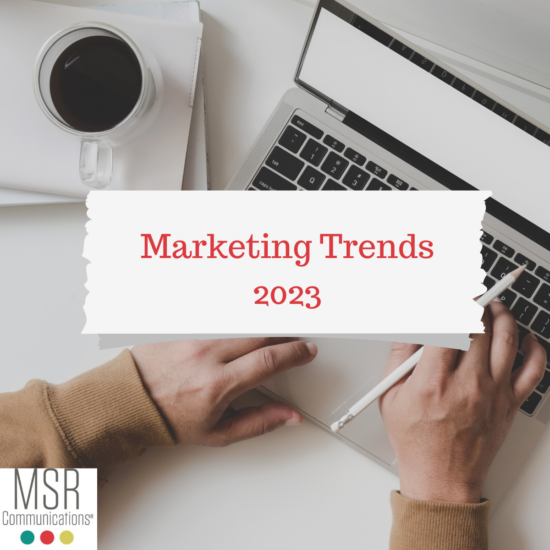Originally published Feb 15, 2023
It’s no surprise that marketing is an important element of any business plan and it’s especially critical during uncertain economic conditions. The concept of ‘marketing’ was first introduced in the 1900s as a new way to create, communicate, and deliver value to customers and prospects. This remains true today, but how marketing professionals create and deliver value has evolved significantly since then.
With decades of evolution and investments in new forms of mediums–from radio to television, to print flyers and newspapers, and even motion pictures; and now web, mobile apps, and video–traditional marketing has continually progressed with new technology, tools, and methods that provide broader access to target audiences. Add to that modern-day data analytics, newer social media and content marketing platforms, web3 capabilities, virtual and augmented reality; and the latest advertising and public relations techniques; and marketers have more engaging ways than ever to reach their target customers.
Technology has also dramatically changed the way people receive and digest content. With the abundance of information available at their fingertips on every medium, customers are typically able to research products and services before they ever make a purchase. However, with all of this innovation, consumers can easily become distracted. Today, the average consumer can hold their attention for eight seconds which means marketers need to continually understand customers’ individual personas. Shorter attention spans have placed greater demands on marketers to regularly review their toolboxes, stay ahead of trends, and market directly to customer needs and pain points to create a lasting impact.
Wondering which trends are worth exploring? We’ve compiled a list of four trends we believe can help marketers make an impact today and in 2023.
- Improved Customer Experiences: Today, customers expect more from brands, and their experiences dictate their loyalty. Customers want a smooth, positive experience or they’ll end a vendor relationship. According to Salesforce, 88% of customers say the experience a company provides is as important as its product or services. The pressure is on for marketers to create these exceptional experiences. One trend we’re seeing is an increased investment in new conversational automation technologies for lead generation and customer support activities such as AI-powered digital assistants. Conversational AI technologies that benefit from GPT large language models can engage with customers in personalized, humanlike two-way conversations. This transforms customer experiences from frustrating interactions with pre-scripted machines that don’t address customers’ specific questions or anticipate their needs into white-glove, concierge-style services. This level of personalization and engagement is what creates brand loyalty and leads to revenue for companies. A report by 451 Research found nearly 80% of companies plan to invest in this type of technology.
- More Video Content: It’s no secret that video content is more engaging than written content. Videos garner 1200% more shares than text and images combined. And it’s also shown to increase buying intent. According to a study of B2B buyers, 95% said video played a crucial role in their purchasing decisions. Another video survey found 79% of respondents were convinced to buy software or an app after watching a video. When created impactfully, viewers will stick around and give you their full attention, typically resulting in positive experiences for both the brand and the consumer.
- Investments in Hybrid Event Marketing: The pandemic changed how B2B marketers use events to deliver value to existing and potential customers, employees, and partners. They went from in-person to virtual nearly overnight. After online video fatigue set in due to the lockdown, they had to pivot once more to hybrid events that offer participants the option to attend in person or from the comfort of their remote locations without the travel and time costs of airline fares and hotel stays. What’s in store for the future? Marketers aren’t giving up on virtual events, but they also recognize there are drawbacks, and instances where meeting in person is what’s necessary to engage with key contacts and content. According to a survey of marketing event decision-makers, 86% were confident that a mix of virtual and hybrid events can achieve more success than just in-person or online-only events. With the economic outlook in flux and budget tightening, hybrid events options appear to be here to stay for the foreseeable future.
- An Eye on Podcasts: Podcasts have become increasingly popular thanks to the pandemic. With podcasts, marketers have the opportunity to drive brand awareness among tech-savvy and broader target audiences. Although people are often multitasking when they listen to podcasts, Statista found 69% of listeners learned about a new product or service and 38% reported purchasing things that were mentioned in a podcast. Whether one is a guest on a podcast or a host, this medium is a great way for companies to expand their reach and position executives as experts in various categories across a wide range of interests and industries. Company-branded podcasts are worth exploring as they offer marketers additional opportunities to cross-promote their own brands with those who will be featured.
Whether it’s investing in new technology such as conversational AI, creating and distributing more video content, holding a hybrid event, or hosting or being a guest on a podcast, there are a variety of effective marketing tools with which to increase customer and prospect engagement in this changing market.
Have you had success with one of them? Are there other trends you would add to the list? Share your thoughts with us.



